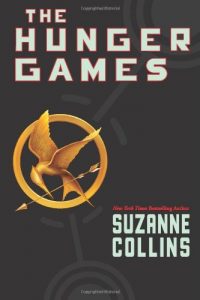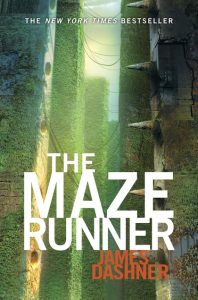 A forthcoming movie announcement led to a few people (my former roommate decidedly not among them) raving about The Hunger Games trilogy, which I had never heard of before that moment. This is understandable, since it’s written under the auspices of the young adult section of ye olde bookestores, which I have not often entered in this post- Harry Potter world. But all the same, a dystopian future America with hidden secrets in which teens are randomly selected every year to compete in a fight to the death, all so that the Capitol can flex its muscles over the 12 districts? It’s like someone watched Battle Royale and decided to rewrite it so that backstory would make sense. Obviously, once someone got around to telling me about it I wanted to read it for myself!
A forthcoming movie announcement led to a few people (my former roommate decidedly not among them) raving about The Hunger Games trilogy, which I had never heard of before that moment. This is understandable, since it’s written under the auspices of the young adult section of ye olde bookestores, which I have not often entered in this post- Harry Potter world. But all the same, a dystopian future America with hidden secrets in which teens are randomly selected every year to compete in a fight to the death, all so that the Capitol can flex its muscles over the 12 districts? It’s like someone watched Battle Royale and decided to rewrite it so that backstory would make sense. Obviously, once someone got around to telling me about it I wanted to read it for myself!
Anyway, the upshot is that while I learned all about the Hunger Games themselves[1] and a fair amount about Katniss Everdeen, our narrator-heroine, I did not learn very much yet about the hidden secrets of the dark future. But that’s cool, I have two other books where that can happen, and in the meantime the book was just compulsively readable. Of course, it had a few problems as well, though I hasten to add that none of them dampened my interest one bit. It’s written mostly in present voice, although it dips into the past for flashbacks and history lessons. I thought that would turn out to be a problem, but it’s not so bad, I’m just not used to seeing it. The other, larger problem, is that Katniss is sometimes jaw-droppingly oblivious as a direct result of her overabundance of natural suspicion[2]. I thought this would break the character, and it may yet, but not so far; because, so far, it has been at least as much hindrance to her as it has been benefit, and it turns out I’m interested in reading about characters with flaws that actually affect the progression of the story. As long as she either fixes herself or eventually gets badly hurt, I will have no complaint here either in the long run. (And it’s not like that suspicion of hers is unjustified, given her world.)
So, cool setting, cool plot, interesting narrator, and if the rest of the characters were just a little beyond two-dimensional at best, well, that didn’t bother me through the voice of this particular narrator. It might in the movie, but then again, the characters in the movie might have more depth. All that matters for now is, y’know, this was a pretty good book! I should find the next one, eh?
[1] Enough to make me wonder how they can adapt this young adult book as anything but an R-rated festival of violence without changing a lot of things during the Games themselves. I shouldn’t care about that, but, well, you saw the Battle Royale reference earlier, right?
[2] Well, okay, and a third problem, not so much for me but maybe for you if you are not in fact a teenaged reader, which I expect you will not be if you’re reading this particular review, is the occasionally awkward “Who do I really like, if anyone?” or “What will my first kiss be like?” folderol that when you get right down to it are the only parts of the book that felt like they were aimed at a young adult audience, and I almost wonder if they were conceived after the fact to get the book into this particular… genre? That doesn’t seem like it should be the right word.
 I finished the second second Robin Hobb book and its review just before my annual five day camping trip, which was good timing because I wanted small easy books to read, instead of dragging around a doorstop in the woods. But then I made a terrible mistake. In the midst of packing, every book I intended to bring (and the Kindle) were left on a shelf. Which meant, a day or so later when it was time to read, I had nothing!
I finished the second second Robin Hobb book and its review just before my annual five day camping trip, which was good timing because I wanted small easy books to read, instead of dragging around a doorstop in the woods. But then I made a terrible mistake. In the midst of packing, every book I intended to bring (and the Kindle) were left on a shelf. Which meant, a day or so later when it was time to read, I had nothing! A forthcoming movie announcement led to a few people (my former roommate decidedly not among them) raving about
A forthcoming movie announcement led to a few people (my former roommate decidedly not among them) raving about